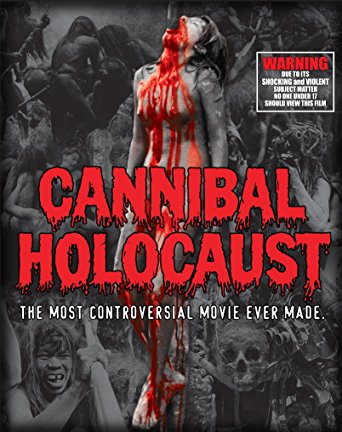 Cannibal Holocaust has many descriptors, but only one matters: filth. People watch it because it’s filth. Midway through, an anthropologist and his guide surreptitiously watch a native ritually rape and sacrifice an adulteress. “Enjoy the show,” his guide advises. The anthropologist throws up, but doesn’t stop watching.
Cannibal Holocaust has many descriptors, but only one matters: filth. People watch it because it’s filth. Midway through, an anthropologist and his guide surreptitiously watch a native ritually rape and sacrifice an adulteress. “Enjoy the show,” his guide advises. The anthropologist throws up, but doesn’t stop watching.
Few films manage to capture such vileness and perversity. The jungle’s heat and humidity seems to press upon you through whatever piece of glass you watch it on. The camera lens itself appears infected, like a petri dish. The soundtrack mixes whimsical Italian pop, eerie tribal percussion, and experimental electronic music, becoming a bleeding and suppurating welt of sound.
The plot is secondary, or tertiary, or duodenary. An anthropologist is in the Amazon, searching for a film crew that went missing many months before. He discovers their tapes, brings them back to civilisation, and watches them. There isn’t much to this movie beyond a powerful impression of sickness. But it’s clever: because it knows to keeps the viewer at arm’s length. Other than one attempt at a moral point (“what if WE’RE the real cannibals?”), the violence happens very far from home, both literally and morally. You don’t feel threatened by the gore and bloodshed, or the fact that you’re enjoying it. It happens in a part of the world so strange that it feels like an alien planet, and everyone who dies is either a primitive native, or a white person who “deserves it” (the missing film crew are established as arrogant and dislikeable). That was Cannibal Holocaust’s “it factor”. Guiltless violence.
There was a “shock jock” radio duo called Opie and Anthony who were famous for their sex-based stunts (such as launching fireworks out of a female fan’s vagina, which sounds very boring over a radio show, but whatever.) At the peak of their infamy, they were interviewed by conservative talk show host Bill O’Reilly. They described their on-air hijinks, and he took them to task, calling them disgusting and degrading to women and so forth. Very well, they’d expected that. They gave him stock answers. Mumble, radio show, mumble, entertainment, mumble, First Amendment. Next question, please.
But O’Reilly wouldn’t let the topic go. He kept coming back to it, over and over, like a dog with a bone. The sex. The nastiness. He wanted to hear all about it. He wanted them to describe it. He wanted to register his shock and disgust, repeatedly. They had an epiphany: O’Reilly was exploiting sex in the exact same way they were. But because his audience was made of grandmas and geezers (median age of Fox News’ primetime audience: 68, according to Nielsen), he had to cloak his pruriance in moral disapproval. It was his way of getting filth on the air: he just had to make sure it was coming from someone other than him, with him wagging a disapproving finger.
Everyone loves perversion, but some of us are hypocrites about it. There’s a saying among prostitutes: he who points with one hand is masturbating with the other.
I won’t overstate Cannibal Holocaust’s cleverness. Of course, “awful things happening in foreign lands” is a common trope, even outside cinema. Octave Mirbeau’s The Torture Garden features long, almost slavering descriptions of the tortures supposedly carried out in Cathay, and George MacDonald Fraser’s Flashman novels work at a similar level (Marquis de Sade, with typical ballsiness, set all of his atrocity porn within his own nation of France). In fact, Cannibal Holocaust’s portrayal of natives will discomfort modern viewers, even beyond any of the events of the film. You’re not supposed to make indiginous peoples look like savages, and monsters. They’re people!
Yes, they’re people. But at real life digging sites, all around the world, anthropologists find human bones in ominous proximity to camfires. Sometimes they’re roasted and split, the marrow sucked out. The events portrayed in the film have really happened, sometimes shockingly recently (the Fore people of Papua New Guinea were practicing cannibalism as late as the 1960s). The truth is, you don’t need to be a monster to eat another person. Even we would do it, if circumstances required. If we are only three missed meals away from anarchy, how far away is cannibalism? Four missed meals? Five? The day might come, and then we will see how much ironic distance Cannibal Holocaust has.
It’s shot well. It has a strong atmosphere. It has all the grace and subtlety of a flint axehead crunching through your parietal lobe. There are some good performances. It is a good movie, by many categories.
But it’s filth. Not just at the surface, but right the way through. After a wave of bannings, censored cuts of it were released, but they did no good. You can’t wash clean a pair of hands that are made of dirt.
No Comments »
Comments are moderated and may take up to 24 hours to appear.
No comments yet.
